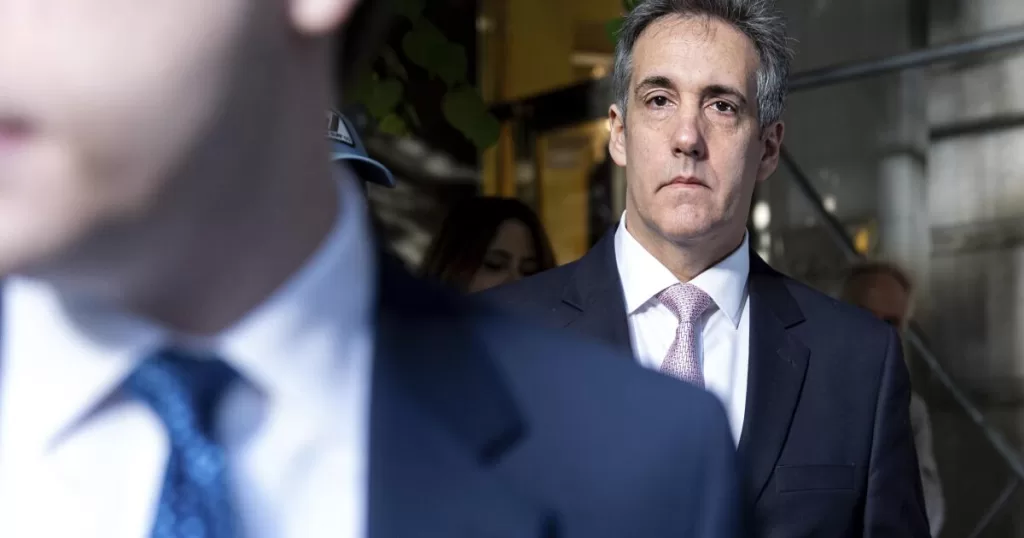In the early hours of his testimony, the former Trump attorney covered the National Enquirer’s alleged agreement to “catch and kill” stories that might damage the then-candidate, which like much of Cohen’s expected testimony had been detailed by other witnesses. He then discussed the revelation of the “Access Hollywood” recording that threw the campaign into a tailspin, including Trump’s instructions to spin his comments about sexually assaulting women as mere “locker room talk.”
Cohen testified that it was during the feverish efforts to manage that crisis that he learned that the adult-film actor Stormy Daniels was shopping her story of a liaison with Trump, something that he said would have been “catastrophic” for the campaign. He said Trump ordered him to do what he had to do to keep the story from coming out before the election.
Cohen came across on the stand as responsive, matter-of-fact and unguarded in response to Assistant Dist. Atty. Susan Hoffinger’s low-key questioning.
From the opening arguments, both sides have acknowledged Cohen’s central role in the charges against his former boss, for whom he was an uber-loyal fixer and attack dog. And both sides have taken pains to stress Cohen’s credibility problems to the jury.
The defense in fact has put nearly all its chips on the chances that the jury will reject Cohen’s story, making his coming cross-examination the dramatic centerpiece of the trial. More surprisingly, the prosecution has also peppered its presentation with disparagement of Cohen, whom several witnesses portrayed as a self-interested blowhard.
The most significant instance came during the testimony of Hope Hicks, who related that Trump had told her that Cohen paid off Daniels “out of the goodness of his heart” rather than any direction from him. The prosecution then asked a devastating follow-up: Did that seem in keeping with Cohen’s character? No, Hicks responded, she “didn’t know Michael to be an especially charitable person or selfless person.”
Translation: Trump had reimbursed Cohen and lied to Hicks about it. It may have been this honest and damaging assessment that caused Hicks to break into tears.
The prosecution’s participation in pummeling Cohen was good strategy. It likely lowered the jury’s expectations, decreasing the enormous weight on the shoulders of the government’s star witness.
The jury had to be prepared for a witness whose record comprises multiple criminal convictions, such as the illegal payments at issue in this very trial. The prosecution is betting that having already absorbed the bad news, the jurors can listen to Cohen with relatively open minds.
And here’s the thing about Cohen, in my subjective opinion: It comes through that he is telling the truth.
Yes, he is a strong personality — a native New Yorker through and through — and, yes, he has an enormous ax to grind with Trump, who has remained free (so far) while Cohen went to jail for him. But there’s a difference between a witness with credibility problems, however great, and one who is lying, and divining that distinction is what the jury system is for.
We’ve seen that already in this trial with the testimony of Daniels and David Pecker, the louche tabloid muckraker who described the “catch and kill” scheme. Both gave the defense plenty of ammunition for cross-examination, but both came across essentially as telling the truth.
Cohen has been consistent in his story since he turned traitor on Trump, and his earlier lies are easy to understand in the context of his former sycophancy.
Most important, if the cornerstone of the defense is what will no doubt be a savage cross-examination of Cohen, the foundation of the government’s case is its corroboration of his testimony. Starting with the prosecutors’ smart decision to lead with Pecker, their presentation has been designed to prospectively corroborate Cohen. The jurors will be able to recognize nearly every detail from having heard it before.
Cohen will have to carry a few key details alone, however, the most important of which concern two meetings. One was a January 2017 meeting among Trump, Cohen and Allen Weisselberg, the Trump Organization’s longtime chief financial officer and ultimate loyal fall guy, in which Trump allegedly told the two men to work out a plan to reimburse Cohen. The other is a February 2017 meeting between Cohen and Trump in which the then-president allegedly signed off on reimbursing his fixer with monthly payments camouflaged as a legal retainer.
Strong corroborating evidence of the arrangement can be found in what is probably the most important document in the case: an invoice with Weisselberg’s handwritten annotations explaining how Cohen’s $130,000 payment became $420,000 in reimbursements, including taxes and other considerations.
But as far as the jury is concerned, Weisselberg, who could confirm the arrangement and Trump’s role in it, is nowhere to be seen. That’s because he’s at Rikers Island serving a perjury sentence for lying to protect Trump. In fact, it emerged last week that the district attorney’s office hadn’t even tried to reach the former executive, presumably assuming he would continue to do whatever he could to help Trump.
Weisselberg’s absence is a reminder that prosecutors have to play with the cards they’re dealt. Trump continues to exercise a powerful influence over those in his orbit, and Weisselberg is just one example of a witness the district attorney can’t rely on for that reason.
All of which only heightens Cohen’s importance for the prosecution. This week’s testimony will determine whether his word is strong enough to support a measure of accountability for his former boss.
Harry Litman is the host of the “Talking Feds” podcast and the Talking San Diego speaker series. @harrylitman
